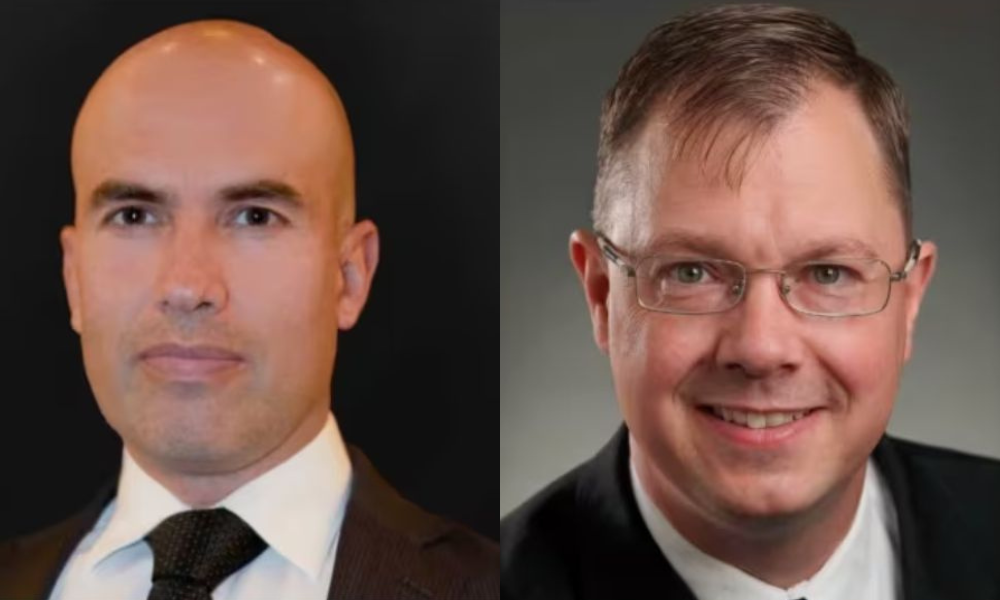Carpay, Cameron not permitted to contact Manitoba Chief Justice, banned from practice for three years

Despite agreeing to civil peace bonds preventing them from practising law anywhere in the country for the next three years, one expert says that John Carpay and Jay Cameron will likely continue to face disciplinary actions.
“The picture show isn’t over; there is still possible discipline to come from the Law Society of Alberta,” says William Haight, a lawyer with Phillips Aiello Barristers & Solicitors. Based in Winnipeg, most of Haight’s practice involves professional regulatory law, including acting for regulators or serving as counsel to discipline panels. Haight is also a life bencher of the Law Society of Manitoba and a former chair of its discipline and complaints investigation committees.
 William Haight
William Haight
“We don’t know for certain that there is one, but one would expect there would be. The reason is because the Law Society of Alberta needs to govern its members in the interest of the public. My experience is that if you have a sister or brother regulatory body that administers a sanction against one of your members, that regulatory body will take that seriously, and will investigate it and will determine what, if anything more, needs to occur.
“Even though they can’t comment on an investigation, I think it’s a pretty sure bet that there is one ongoing already, that there has been one ongoing for some time as a result of the agreement between the Law Society of Alberta and the Law Society of Manitoba that the Law Society of Manitoba should prosecute the matter since it happened in the Manitoba jurisdiction.”
Carpay and Cameron, who are both Alberta-based lawyers, made headlines across Canada after being charged in Manitoba with intimidation of a justice system participant (under s. 4.23.1(1)(b) of the Criminal Code of Canada) and obstructing justice (s. 139.2) after the province’s chief justice found himself under surveillance.
In addition to being a lawyer, Carpay is president of the Justice Centre for Constitutional Freedoms (JCCF), which describes itself as “a Canadian legal organization and federally registered charity that defends the constitutional freedoms of Canadians, through pro bono legal representation and by educating Canadians about the free society.” JCCF undertook to challenge COVID-19-related health restrictions in the court on behalf of several organizations. Cameron was one of the lawyers involved in the legal matter, which came to be known as the Gateway case. Chief Justice Glenn Joyal was the presiding judge.
In June 2021, while the case was on reserve, waiting for the judge’s decision, Carpay hired a private investigation service to conduct passive surveillance of Premier Brian Pallister and Dr. Brent Roussin, the province’s chief public health officer, to see if they were complying with the public health orders. Then, he added the chief justice to the surveillance list. The chief justice noticed the surveillance and contacted the Winnipeg Police Service.
According to the facts read into the record, “Mr. Carpay told the Court that he had retained the private investigator on behalf of JCCF in order to determine whether government officials were complying with public health orders, and stated that the surveillance ‘has nothing to do with the litigation.’ He further stated that the surveillance was not ‘targeted’ at the Chief Justice.”
According to those same facts, the surveillance was part of Cameron’s planned legal strategy: “Mr. Cameron proposed using any proof of officials breaching the public health restrictions in an Affidavit to potentially support an argument for the orders being arbitrary.”
The chief justice met with Cameron and Carpay in July 2021 and questioned them about the surveillance. Then, in October, he delivered his reason for judgment in Gateway and dismissed it.
Carpay’s and Cameron’s actions led the Law Society of Manitoba to take disciplinary action against them. Carpay was charged with three counts of professional misconduct: one count of failing to treat the court with candour, fairness, courtesy, and respect, one count of undermining the public respect for the administration of justice and one count of failing to discharge all of his responsibilities to his client, tribunals, the public and other members of the profession honourably and with integrity. Cameron was charged with one count of professional misconduct for failing to discharge his responsibilities to his clients, the court, the public, the LSM and other members of the profession honourably and with integrity. In September 2023, both were permanently banned from practising law in the province, and each was required to pay $5,000 to contribute to the costs of the LSM investigation and prosecution of the charges.
“The conduct of Mr. Carpay and Mr. Cameron is unprecedented in Manitoba. Lawyers are expected to act with integrity at all times. They are expected to uphold the administration of justice, the independence of the profession and the independence of the judiciary. They not only brought the administration of justice into disrepute, they acted without integrity in their submissions to the Chief Justice regarding their respective involvement in the decision to have him followed,” said the law society in a statement emailed to Canadian Lawyer.
The email also drew attention to part of the discipline decision, which asserted that “judges must have no fear of being subjected to harassment or physical harm when they are sitting on controversial cases. These cases must be adjudicated in the environment of a fair and impartial judicial process, and society simply cannot tolerate having judges shying away from making unpopular (yet still necessary and legally sound) decisions because of concerns for their personal safety or the safety of those close to them. The harassment of one judge is a psychological threat to all judges, and cannot be tolerated in a free and democratic society.”
The latest development in Carpay’s and Cameron’s legal entanglement happened on October 27 in Winnipeg at the Court of King’s Bench, where Carpay and Cameron signed consent orders to be bound by civil peace bonds and subjected to the conditions that for three years, they “must not engage in the practice of law anywhere in Canada” and they “must not contact or communicate with, directly or indirectly, Chief Justice Glenn Joyal.”
The outcome satisfies Chris Vanderhooft, general counsel with the Manitoba Prosecution Service, and the Crown who brought the charges against the lawyers.
“We always have to consider the same two things: the reasonable likelihood of conviction and public interest in any matter,” explains Vanderhooft.
“In this case, it wasn’t really a situation where we no longer had a reasonable likelihood of conviction, but rather, was there an appropriate resolution that we were satisfied would serve the ends of justice and the public interest? It’s not that we didn’t have grounds to proceed – I made that clear in court. But we reached an agreement where we felt the resolution was appropriate. It would avoid the necessity of trial and court resources. And it would achieve the goal of banning these lawyers from practising anywhere in Canada for three years – and that may not even have been a result that was available after a trial if there was a conviction.”
The maximum sentence for obstructing justice, if proceeded on by indictment (which was the case in this situation), is imprisonment for a term not exceeding two years. The intimidation of justice charge carries a possible imprisonment term of not more than 14 years, according to Vanderhooft.
“But when you’re dealing with individuals who have no prior record and no prior history with the law society, the likelihood of sentences involving jail would probably not be realistic,” he says.
Vanderhooft says the three-year ban sends a message about the lawyers’ actions.
“There’s certainly an element of general deterrence and denunciation that is achieved by that kind of disposition. And a consequence of that is that lawyers need to understand that any attempt to have a judge followed or surveilled in any way is going to have to be taken seriously. First of all, it’s going to affect your ability to practise law at all. They were banned in Manitoba by the law society’s ruling, and … they admitted to what they did in front of the law society, so it would have been difficult to not admit the same things in front of the court.
“It does achieve that goal of making sure that people know that if this is the sort of thing they’re going to engage in as counsel, that there will be consequences, and there will likely be criminal charges.”
According to Vanderhooft, the chief justice’s reactions to the surveillance didn’t come into play – it was the actions directed and performed by Carpay and Carson that mattered.
“Intimidation can be proven, even if there was no intent to cause fear. But that fear could have been caused in the circumstances. The Crown accepts that the intention of both accused was not to cause actual fear. But it was egregiously misguided, and that they made a decision that neglected their overriding duty to the court,” he says.
“For any lawyer who would think of such a thing, they owe a responsibility or duty to their client, but their duty to their client is subject to their overriding duty to the court.”
Vanderhooft emphasizes that the resolution of the Gateway matter demonstrated the strength of the court system and the chief justice even when faced with intimidation.
“The chief justice confronted them on the record and then continued to make his decision based on the law and the record before him. Not only was he not intimidated, he upheld the role of an independent judiciary. That is what we expect from judges in Canada. And that is exactly what happened here. A decision made based on evidence and law free from any other influence.”
As to the actions of Cameron and Carpay, Haight can only describe them as “unprecedented” and says that they are damaging not just to themselves but to the legal system as a whole.
“I think most lawyers would understand that this isn’t something you should do,” he says. “Not just any lawyer, but any member of the public would universally understand that this is conduct that a) should not occur and b) could adversely impact the reputation of lawyers, the reputation of the profession generally and the reputation of the administration of justice. It has far-reaching effects.”
That Cameron and Carpay admitted to their actions is something that Haight says is taken into effect in professional regulatory law. He names it as one of the important factors in determining sanctions and any law society deciding whether a lawyer should be able to continue to practise after breaking the society’s rules. Based on pleading guilty and agreeing on the peace bond, Haight says he suspects Carpay and Cameron have come to understand the severity of their transgressions fully.
While he is sympathetic to lawyers who want to do the best for their clients and vigorously argue for them, he says Carpay and Cameron went too far.
“You have to fearlessly raise every issue…and lawyers can be blinded by that. …It is something that I think most lawyers have grappled with and have seen grey areas as opposed to black and white. This was not a grey area case. This was a black and whiter.”










